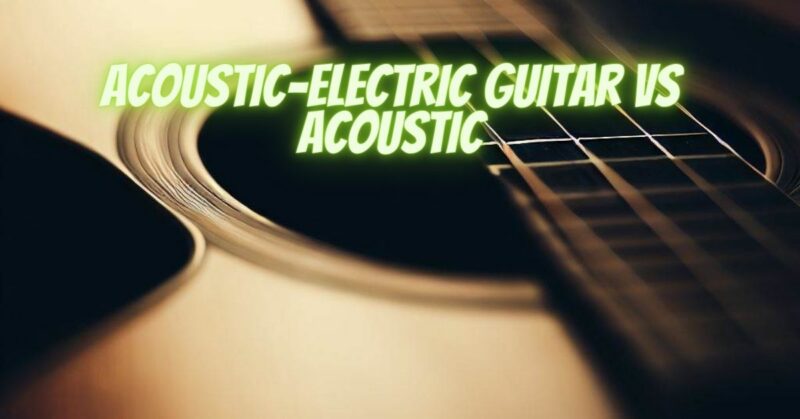When it comes to choosing a guitar, one of the key decisions you’ll need to make is whether to go for an acoustic-electric guitar or a traditional acoustic guitar. Both types have their unique characteristics and are suited for different playing styles and preferences. In this article, we will explore the differences between acoustic-electric guitars and acoustic guitars, helping you make an informed choice that best suits your musical needs and aspirations.
Acoustic Guitar:
The traditional acoustic guitar is a timeless instrument loved for its pure and natural sound. It produces music solely acoustically, relying on the resonance of the hollow body and soundboard to amplify the strings’ vibrations. Acoustic guitars come in various body shapes, such as dreadnought, concert, auditorium, and jumbo, each offering distinct tonal qualities.
Pros of Acoustic Guitars:
- Pure Acoustic Sound: Acoustic guitars deliver a warm, natural, and resonant sound without the need for amplification or electronics.
- Simple and Lightweight: Traditional acoustic guitars are simpler in design and lighter in weight since they do not have additional electronic components.
- Portability: Acoustic guitars are easy to carry around and play without the need for additional equipment like amplifiers.
- Unplugged Versatility: They are well-suited for small gatherings, campfires, and intimate performances without the need for power sources or additional setup.
Cons of Acoustic Guitars:
- Limited Volume: Acoustic guitars may struggle to project sound in larger venues or noisy environments without external amplification.
- No Built-in Electronics: They lack built-in pickups and preamps, limiting their compatibility with amplification and recording.
Acoustic-Electric Guitar:
Acoustic-electric guitars combine the acoustic sound of traditional guitars with built-in electronics for amplification and recording purposes. These guitars feature pickups installed under the saddle or in the soundhole, allowing them to be connected to amplifiers or sound systems.
Pros of Acoustic-Electric Guitars:
- Versatility: Acoustic-electric guitars offer the best of both worlds, providing the option to play acoustically or connect to amplifiers for larger audiences and performances.
- Amplification Capability: They can be easily amplified for stage performances, making them suitable for gigs and concerts.
- Onboard Controls: Most acoustic-electric guitars come with onboard controls and EQ, allowing players to shape their sound to suit different environments and playing styles.
- Recording Flexibility: Acoustic-electric guitars can be directly connected to recording equipment, making them a convenient option for studio sessions.
Cons of Acoustic-Electric Guitars:
- Additional Weight: The built-in electronics and pickups add weight to the guitar, making it slightly heavier than traditional acoustic guitars.
- Complex Setup: Using an acoustic-electric guitar requires connecting it to an amplifier or sound system, which may not be as straightforward as playing a traditional acoustic guitar.
The choice between an acoustic-electric guitar and a traditional acoustic guitar ultimately depends on your musical preferences, playing style, and performance needs. If you prioritize the pure and natural acoustic sound and prefer simplicity and portability, a traditional acoustic guitar may be the perfect choice. On the other hand, if you require versatility, the option to amplify your sound for larger performances, and the convenience of built-in electronics, an acoustic-electric guitar is a great investment.
Regardless of your choice, both acoustic-electric and acoustic guitars offer incredible musical experiences, each with its own charm and appeal. Take the time to try out different guitars and consider the type of music you want to play, as well as the venues and settings where you plan to perform. By doing so, you can select the guitar that resonates with you and complements your musical journey.


